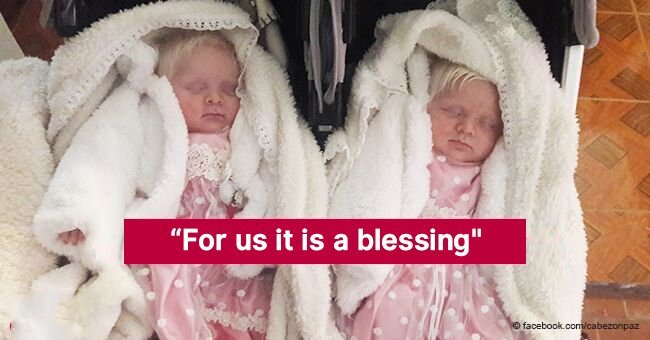
Rare newborn albino-twins caused a sensation in Argentina
Argentina recently had its first set of albino twins, and they instantly became viral sensations.
Little Virginia and Catalina, born in Tucumán Province, northern Argentina, were instant celebrities the moment they got out of their mother’s womb.
People gushed over the two little Snow Whites as photos of them were being passed around on social media.
Follow us on Twitter at AmoMama USA for more details and updates.
The twins were born early at 36 weeks, and you can only imagine the surprised look on their parents' faces, including the hospital staff’s, when they laid eyes on the pair.
The eldest twin is Catalina and she weighed 5.95 pounds at birth. As for Virginia, she was born two minutes after at 5.5 pounds.
Speaking with LV12, their father, Jorge Gomez, said, “When they gave us the news that we would have two babies, it gave us a lot of happiness and when they were born and we saw that they were albinos, that happiness did not change at all.”
He continued to say, “For us, it is a blessing.”
Albinism is an extremely rare pigment disorder wherein the skin and the hair have no coloring because the body does not have enough melanin. As revealed by the National Organization of Albinism and Hypopigmentation, in the United States, one out of 17,000 people have the disorder. Still, the chances of twin albinos are even rarer.
As Virginia and Catalina grow up, they will need special care, and everyone around them needs to give them extra attention. Their skin and eyes will be too sensitive to the UV rays from the sun, and they will need constant protection.
It’s a good thing the twins have their loving parents as well as their nine-year-old older brother, who will provide them with proper care.
Most of the time, albinism causes loss of vision and extreme sensitivity to the sun, but sometimes, embarrassment also goes with the disorder. Somehow, people are not as accepting and often shame albinos for being different.
Albinism is caused by genetic mutations that hinder the normal process of melanin production in the body. A cell called melanocyte should be the one responsible for giving pigmentation to the skin, hair, and eyes, and while albinos have that cell, their genetic mutations stop the cells from working properly.